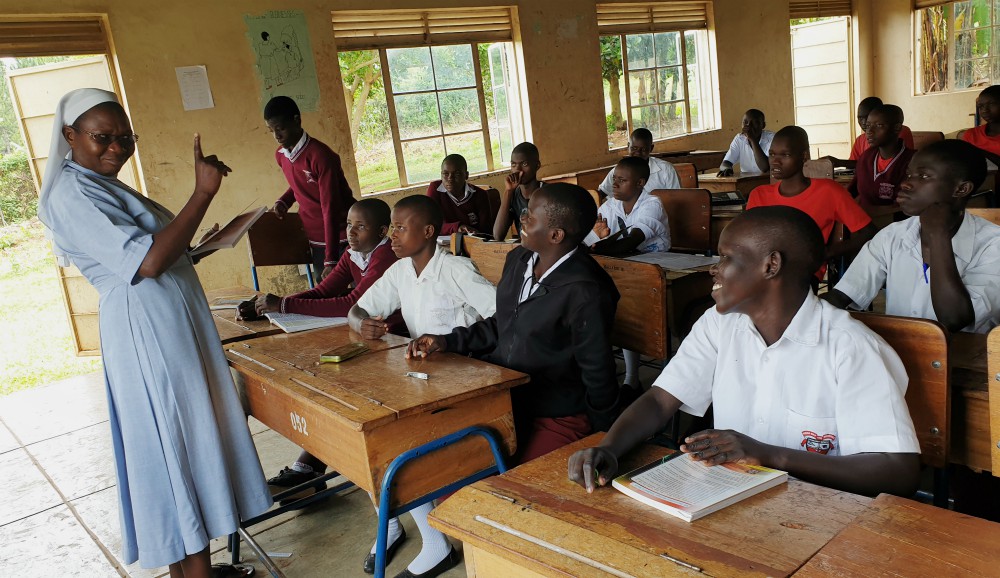
Sr. Rose Nelima interacts with students at Mbale School for the Deaf in Uganda. (Gerald Matembu)
Like in many African settings, deaf and other special-needs children are associated with bad omens, and they receive less affection and attention from their families. In eastern Uganda, the native name for the deaf is "kasiru," meaning "stupid" or "foolish person."
Approximately 2.5 million children in Uganda live with some form of disability, hindering their access to education, health and employment and their ability to realize their full potential.
Despite efforts by government to end the stigma, change of social belief toward children who are disabled, including children who are deaf, remains a challenge. It takes love and passion from stakeholders, especially leaders, to provide the necessary support and environment for deaf students to thrive academically, socially and emotionally as envisaged by the government.
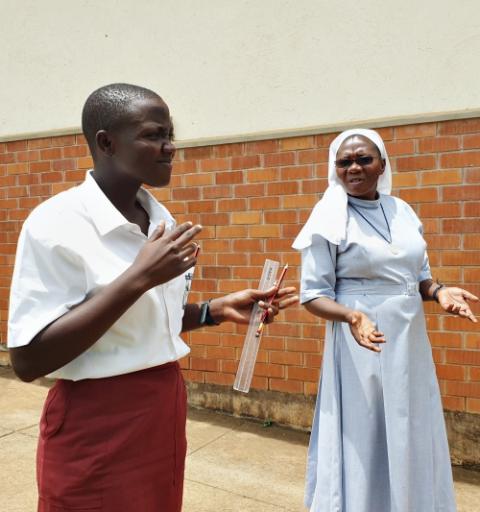
Sr. Rose Nelima converses with one of her deaf students at Mbale School for the Deaf in Uganda. (Gerald Matembu)
Sr. Rose Nelima has used her career in education to promote the education of those who are deaf in Uganda, in addition to reshaping the negative social perception toward the deaf, a job that best fits her dream, passion and Christian mission.
She is headmistress of Mbale School for the Deaf, a government-aided school, and is a renowned activist who fights for the rights of people with disabilities.
"My entry into this school was to fix the enduring administrative gaps, which had become a bottleneck in advancing education to special-needs learners in the country," said Nelima, a member of the Sisters of Mary of Kakamega. "The administrative gaps had put the school at the verge of collapse, and they were stigma-associated."
Nelima traverses communities to encourage parents to take deaf children to school. As headmistress, she ensures an environment for deaf students to thrive and maximize their academic potential.
"I think I have brought hope and a sense of human dignity in the lives of deaf children in the region," said Nelima, who was born in Mbale and holds bachelor's and master's degrees in education from Catholic University of Eastern Africa in Kenya. "The number of students has increased. I have driven the institution from the verge of collapse to the path of excellence amid multiple challenges."
Nelima's dream is to expand the scope of the institution as a way of creating more opportunity for the deaf to maximize their full potential.
GSR: Tell us about your journey to the helm of this school.
Nelima: This school started in 2008. By 2010, it had a lot of administrative challenges. The school was almost collapsing, the deaf were not attending classes, enrollment was not forthcoming, and so the government wanted a religious person to save the administrative challenges.
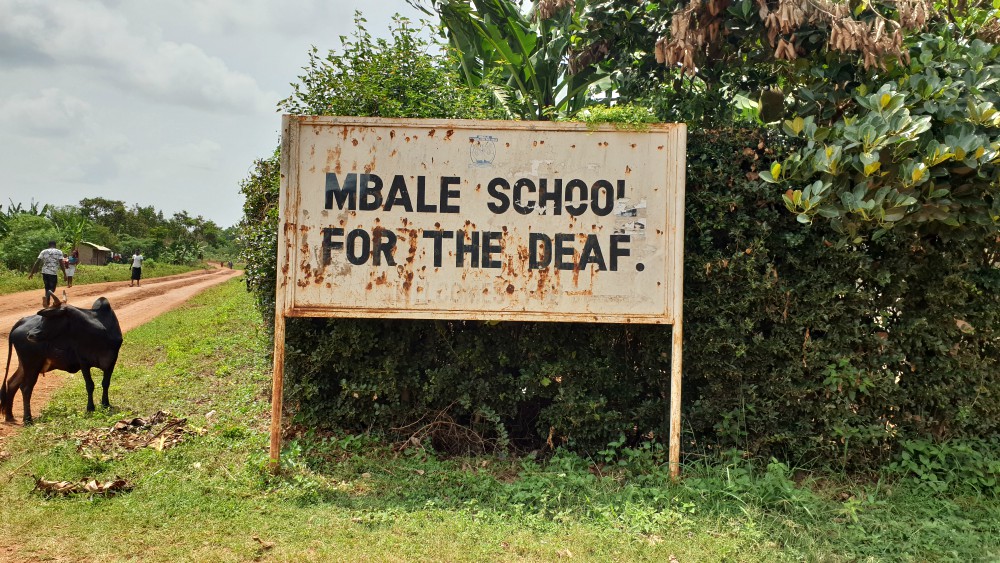
Sr. Rose Nelima advocates for education of those who are deaf and to end social stigma against the deaf in Uganda. (Gerald Matembu)
I was posted here in 2013 as acting deputy head teacher barely one year after joining public service as a class teacher. Five years later, I was appointed headmistress.
What was the state of affairs in the school at the time you joined?
I found many cliques among staff, divisions, gossiping. Children were not being tended.
The head teacher was not recruiting enough teachers on ground. At some point, I had to teach 26 lessons in addition to being acting head teacher. So you are in class, you are in the office, and when you open the office, you cannot eat. It was too much.
I advised the head teacher to get more teachers, but he declined. Because I was acting deputy, they started fighting me because every parent who was coming to school realized that I was close to students and I was listening to their problems. Many teachers didn't feel comfortable because they felt I was outshining them.
The vocational section was not functional at the time. The machines were lying dormant. Others had been stolen or vandalized, and some parts removed.
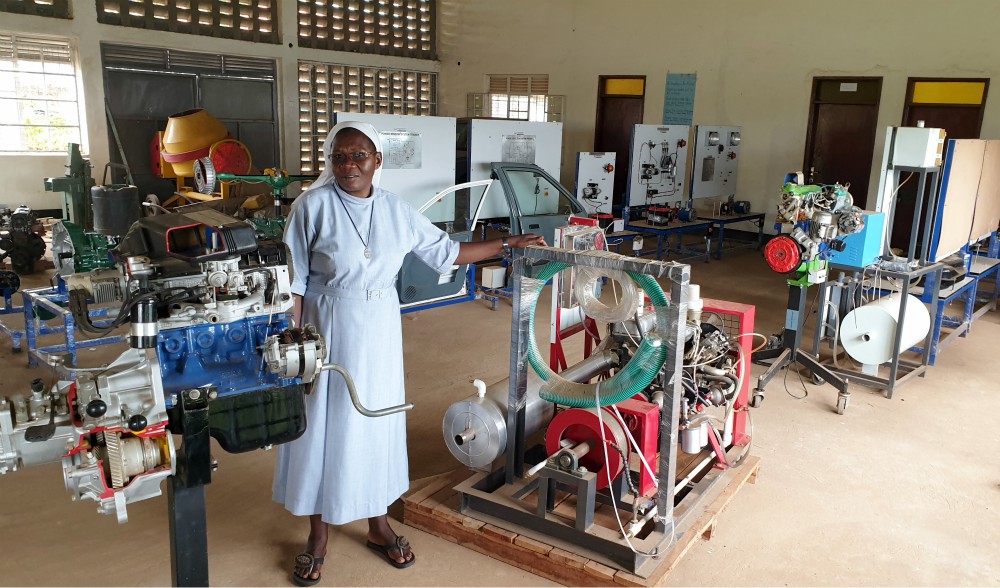
Sr. Rose Nelima displays some of the equipment in the technical wing at Mbale School for the Deaf in Uganda. (Gerald Matembu)
What is your experience dealing with special-needs students?
It is challenging, but if you have people at heart, it is equally enjoyable. The passion I have is that I love these students, and they love me, too. I had to first struggle to learn sign language on my own so I could communicate with them. The moment you explain why you are punishing them, the deaf have no problem. They are emotional, but they are so good.
What bottlenecks do the deaf learners encounter in class?
For some of them, learning is still a problem. Making them pass exams or tests is still a problem. Why? Because teachers are rarely there to teach them, especially for students who are in lower classes. One teacher lectures several classes, and there is that disconnected knowledge.
They find it difficult to take notes because they have to keep their eyes focused on the teacher's signs. So sometimes, the teacher has to first give the notes before the teaching begins such that they just follow the notes. It is straining and time-consuming.
We have few teachers who know sign language. So a teacher has to go to class with an interpreter. This makes the process of learning long, and learners rely on secondary information. They lose the feel of the teacher's communication.
Advertisement
What can be done to make the learning experience of deaf students smoother?
We have nothing to use right now as an institution. We need projectors and computers to enable teachers' project notes as they explain to students. This can actually reduce the time spent giving the lesson.
Tell us more about the social stigma against deaf children in your country.
Many of the parents don't want to pay fees for their children, not because they are poor, but because of the negative attitude toward a deaf child. They take them as stupid and useless people who cannot excel academically.
On the closing day, I have to force them to go home. They tell me that when they go home, they are treated like animals. They are not given enough food, and they can't share the same table with other members of the family.
But I'm happy because I have nurtured some of the students in this institution who have become teachers, and they are assisting others.
What milestones have you registered as head teacher of the school?
The discipline is good. This is my fourth year as the headmistress, and students have not striked like in previous years. The enrollment has also improved from 46 to 321 in three years. Recently, we have attracted students from the Comoro Islands, Tanzania, Burundi and South Sudan.
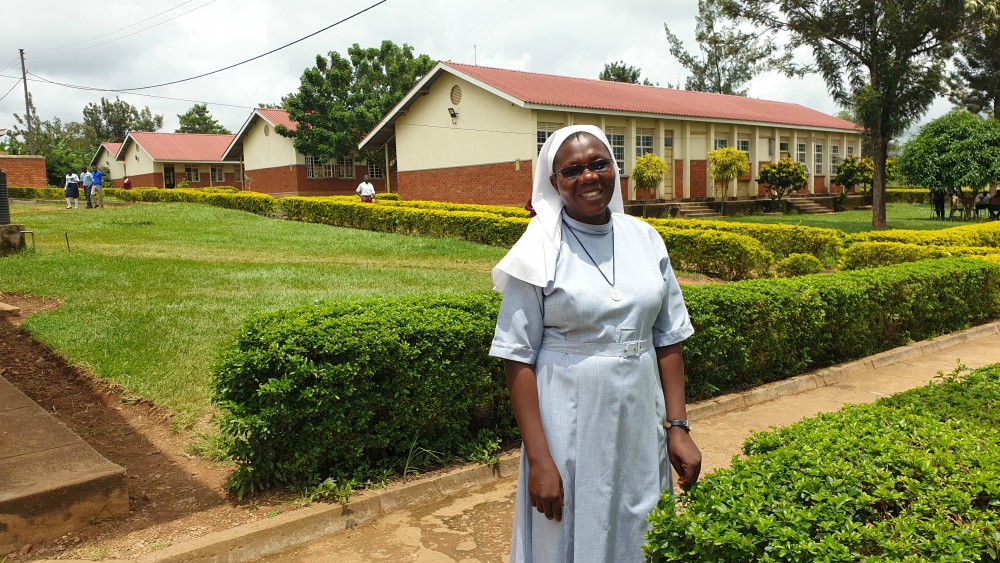
Sr. Rose Nelima on the grounds of Mbale School for the Deaf in Uganda (Gerald Matembu)
I lobbied for more funding from the government. Government funding has increased from 42 million shillings [$11,093] to 105 million shillings [$27,732], in addition to 30 million shillings from parents. This goes into paying utility bills, paying staff who are not on government payroll, buying medication, buying materials for the technical wing, among others.
I have also recruited more staff. When I came here, there were only 11 staff on government payroll, including two administrators. I had to sacrifice everything to have enough teachers on the ground. We now have 103 staff members — 30 are on government payroll, and 73 are paid by the school.
We do well in sports. Students compete among themselves in inter-class sports, and we reward the winning class with a goat. This year, the winning class will get a bull. They are also able to compete with other neighboring schools. So, all these trophies you see, they are for football, and they played against the hearing institutions. The girls play rugby, and they have brought us two trophies.
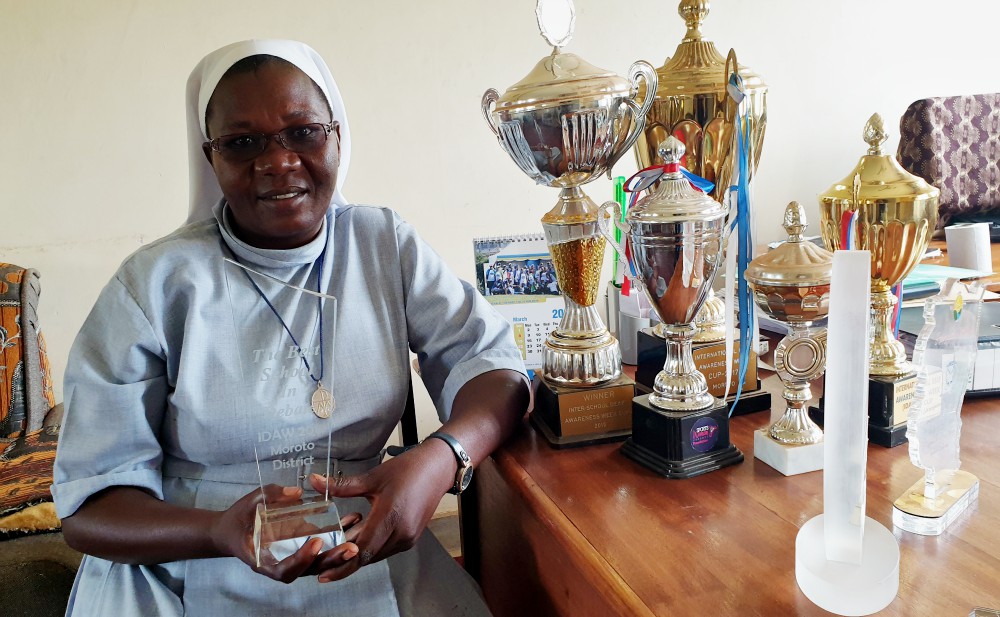
Sr. Rose Nelima displays some of the accolades her students have earned. (Gerald Matembu)
So the spirit in them is so high. The good thing is that once they are trained in something and they get it, they are so amazing. When I came, it was only one trophy, but now you can see all this that we have.
This year, the boys have qualified for volleyball at the regional level after they qualified at the district level. The girls qualified for district football. They are supposed to go up to regional level, but sometimes, they want the school to facilitate, so sometimes we are incapacitated financially, and we end at regional level.
What is your future plan for this institution?
I don't know how long I am going to be here, but my plan is one day, if these buildings can be demolished, to put up multistory ones. We need a primary wing so that it has a feeder primary school. Then also, one day, this institution to go up to diploma level. It is very possible.
Recently, I visited Wales. Among the places we visited is what they called community school by the Welsh government, but built in that model. It was exciting and humbling. I had never seen it, but it was already in my dream. If I got money today, I would demolish these buildings and come up with a real institution.
[Gerald Matembu is a multimedia journalist based in Mbale Town, Eastern Uganda.]







